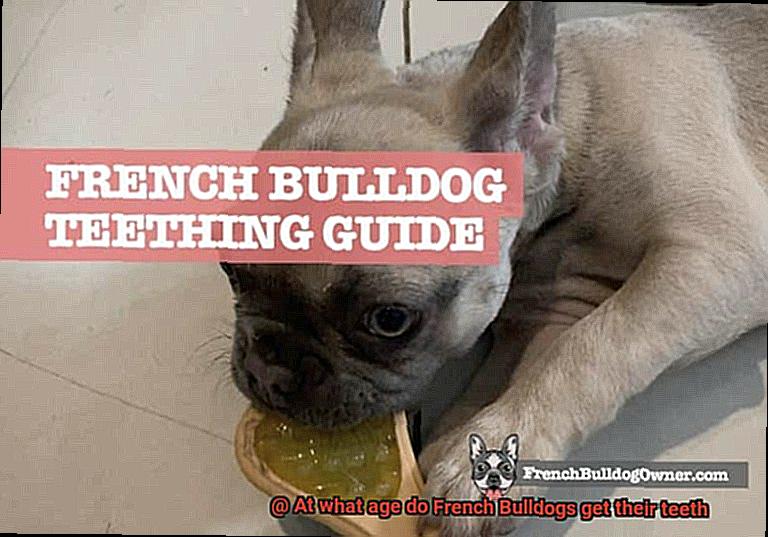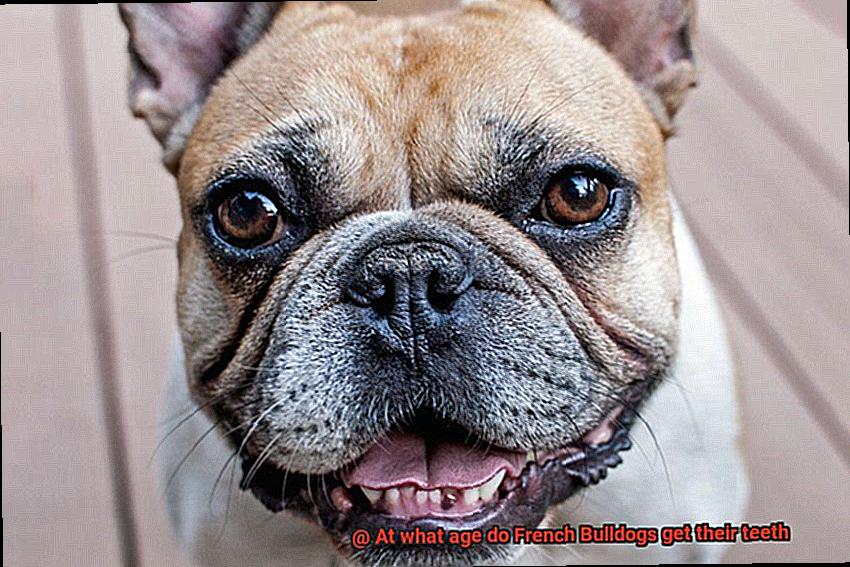At what age do French Bulldogs get their teeth?
Today, we’re tackling a common question that plagues Frenchie owners: when do these adorable pups sprout their pearly whites? Whether you’re already a proud pet parent or considering bringing home one of these charming canines, understanding their dental journey is essential.
Just like us humans, these pint-sized bundles of joy go through various growth stages. Witnessing them hit important milestones is an exhilarating adventure.
So, if you’re curious about when those tiny teeth will make their grand debut, you’ve landed in the right spot. In this article, we’ll uncover the timeline of French Bulldog tooth development and share tips on how to keep their oral health in tip-top shape.
Let’s embark on this fascinating topic together.
At what age do French Bulldogs get their teeth
Contents
- 1 At what age do French Bulldogs get their teeth
- 2 The Teething Process in French Bulldogs
- 3 When Baby Teeth Start to Emerge in French Bulldogs
- 4 The Transition From Baby Teeth to Permanent Teeth
- 5 Individual Differences in the Rate of Tooth Eruption and Loss
- 6 Signs of Abnormalities During Teething
- 7 How to Relieve Discomfort During the Teething Process
- 8 Monitoring Your French Bulldog’s Dental Development
- 9 Tips for Ensuring a Smooth Teething Process for Your French Bulldog
- 10 Conclusion
In this comprehensive guide, we’ll walk you through the teething process of French Bulldogs, from the eruption of their baby teeth to the development of their permanent set. Let’s jump right in.
The Journey Begins: Eruption of Baby Teeth
Around 3 to 4 weeks of age, you’ll notice your French Bulldog puppy starting to develop their baby teeth, also known as deciduous teeth. The incisors, those tiny front teeth, are usually the first to appear between 3 to 5 weeks. Over the next couple of weeks, the canines and premolars will follow suit, typically erupting around 4 to 6 weeks.
The Full Set: Baby Teeth at 8 Weeks Old
By the time your Frenchie reaches 8 weeks old, they should have a complete set of deciduous teeth. These temporary pearly whites help them chew and explore their world as they grow.
Out with the Old: Losing Baby Teeth
When your French Bulldog is around 4 months old, their baby teeth will begin to loosen and fall out. This is a natural part of the teething process as their permanent teeth start pushing through the gums. Don’t worry if you don’t find all the baby teeth lying around – some pups may swallow them while chewing on toys or treats.
Hello, Adult Teeth.
By the time your French Bulldog hits the 6-month mark, most of their permanent teeth should have erupted. Your furry friend should be sporting a full set of 42 adult teeth, including incisors, canines, premolars, and molars. However, it’s important to note that individual variations and delayed tooth eruption can occur within this timeframe.
Coping with Teething Troubles
During the teething process, your French Bulldog may experience discomfort and tenderness in their gums. Increased chewing behavior is a common sign of teething as it helps alleviate the discomfort and promotes the loosening of baby teeth. Ensure you provide appropriate chew toys and treats specifically designed for teething puppies to redirect their chewing behavior and soothe their sensitive gums.
The Teething Process in French Bulldogs
As your adorable furry friend grows, they will go through the teething process. In this blog post, we’ll take you on a journey through this exciting yet challenging phase in your French Bulldog’s life. We’ll provide you with valuable insights and tips to ensure a smooth teething experience for both you and your beloved pet.
The Beginning of the Teething Adventure:
At around 3 to 4 weeks old, your French Bulldog’s baby teeth, also known as deciduous or milk teeth, will start to emerge. These tiny and sharp teeth play a crucial role in helping your puppy chew and explore their surroundings.
The Baby Teeth Fall Out:
Between 12 to 16 weeks of age, your French Bulldog’s baby teeth will begin to fall out, making room for their permanent teeth. It’s common to find these small teeth on the floor or even in your puppy’s mouth. The incisors are usually the first to go, followed by the canine teeth and premolars. Finally, the molars, those larger back teeth used for grinding food, complete the teething process.
Coping with Teething Troubles:
Teething can be uncomfortable for your French Bulldog, leading to symptoms such as increased chewing, drooling, irritability, and swollen gums. To ease their discomfort, provide appropriate chew toys specifically designed for teething puppies. Additionally, offering cold items like frozen carrots or wet washcloths can provide soothing relief.
Monitoring the Teething Process:
It’s crucial to closely monitor your French Bulldog’s teething process. Occasionally, a retained baby tooth can cause issues by preventing the proper alignment of the permanent tooth. If you notice any problems or if a baby tooth does not fall out naturally, consult with your veterinarian for guidance and assistance.
Maintaining Good Oral Hygiene:
Throughout the teething process and beyond, maintaining good oral hygiene is vital for your French Bulldog’s dental health. Regular teeth brushing with a dog-specific toothbrush and toothpaste, combined with routine dental check-ups, can prevent dental issues such as tartar buildup, gum disease, and tooth decay.
When Baby Teeth Start to Emerge in French Bulldogs
Well, get ready for a teething adventure. Just like human babies, French Bulldog puppies are born without teeth. But don’t worry, those tiny milk teeth will begin to emerge around 3 to 4 weeks of age.
The teething process in French Bulldogs typically follows a specific order. The incisors, which are the small front teeth, are usually the first to break through the gums. This is followed by the canines and premolars. Finally, the molars, which are larger back teeth, will make their entrance. By around 12 to 16 weeks of age, most French Bulldogs will have all of their baby teeth fully emerged.
During this teething period, it’s essential to be extra attentive to your puppy’s dental care and training. Teething can be uncomfortable or even painful for them, leading to increased chewing behavior, drooling, and irritability. To help alleviate their discomfort and prevent them from chewing on inappropriate objects, provide appropriate chew toys and teething aids.
But don’t forget about their oral hygiene. Proper dental care is crucial for their overall health. Regular brushing with a dog-friendly toothbrush and toothpaste will help keep their teeth clean and prevent dental issues in the future. And don’t forget to schedule regular veterinary check-ups to ensure their teeth are developing properly and address any potential dental concerns early on.
As your French Bulldog reaches the age of 3 to 7 months, you’ll notice that their baby teeth will start to fall out to make room for their permanent adult teeth. This process is entirely normal and similar to what happens in humans. However, there can be cases of retained baby teeth, where the baby teeth do not fall out on their own and cause overcrowding or other dental problems. If you suspect this is happening, it’s essential to consult with your veterinarian for appropriate intervention.
The Transition From Baby Teeth to Permanent Teeth
From their adorable snuggles to their playful antics, French Bulldogs bring so much joy to our lives. But along with those big ears and squishy faces come a teething adventure that every Frenchie owner must navigate. In this blog post, we’ll explore the fascinating journey from baby teeth to permanent teeth in French Bulldogs, offering insights and tips based on first-hand experience. So buckle up, pet parents, and get ready for some teething troubles.
The Emergence of Baby Teeth:
Just like human babies, French Bulldog puppies are born without teeth. But fear not. Around 3 to 4 weeks of age, their tiny milk teeth begin to emerge. It’s an exciting time as the incisors, canines, premolars, and molars make their grand entrance.
The Uncomfortable Teething Phase:
Teething can be a challenging time for both puppies and owners. As their baby teeth start to give way to permanent ones around 3 to 4 months old, your Frenchie may experience discomfort. Keep an eye out for increased drooling, swollen gums, and a penchant for chewing on anything in sight.
Monitoring the Transition:
It’s essential to monitor your Frenchie’s transition from baby teeth to permanent teeth closely. If their baby teeth linger or their permanent teeth don’t come in correctly, it’s best to seek veterinary intervention. Regular check-ups will ensure everything is progressing smoothly.
The Order of Tooth Loss:
While the order may vary slightly from dog to dog, there’s generally a pattern in which French Bulldogs lose their baby teeth. Incisors are usually the first to fall out, followed by canines, premolars, and molars. It’s like a canine version of musical chairs.
The Arrival of Permanent Teeth:
By around 6 months old, your French Bulldog should have all their permanent teeth. These adult teeth are larger and stronger than their baby counterparts, built to last a lifetime. It’s time to celebrate that shiny, healthy smile.
Dental Care is Key:
Proper dental care plays a crucial role in your Frenchie’s oral health. Regular brushing with dog-friendly toothpaste and toothbrushes designed for our furry friends is essential. Additionally, providing dental chews and scheduling professional cleanings as recommended by your vet will help keep those pearly whites in top shape.
Individual Differences in the Rate of Tooth Eruption and Loss
Individual Differences in the Rate of Tooth Eruption and Loss in French Bulldogs
Understanding the unique timeline and process of tooth eruption and loss in French Bulldogs is crucial for every responsible owner. While there is a general pattern, it’s essential to recognize that individual differences can occur. Let’s dive into the fascinating world of tooth development in French Bulldogs.
The Eruption of Baby Teeth
At around 3 to 4 weeks of age, French Bulldog puppies will start getting their deciduous (baby) teeth. These tiny, sharp teeth allow them to explore their surroundings and begin their chewing adventures. The incisors are usually the first to make an appearance, followed by the canines and premolars.
By the time your French Bulldog reaches 8 weeks of age, they should have a full set of baby teeth. These temporary teeth serve their purpose until the permanent teeth begin to emerge.
The Process of Tooth Eruption and Loss
Tooth eruption and loss, also known as dental transition, typically begins around 3 to 4 months of age in French Bulldogs. However, it’s important to note that individual variations can occur.
The incisors are generally the first baby teeth to be replaced by permanent teeth, followed by the canines and premolars. This process continues until all the baby teeth have been shed and replaced by adult teeth.
Timing Variations
While many French Bulldogs will have all their permanent teeth by around 6 months of age, some individuals may experience a delay in tooth eruption. It’s not uncommon for certain dogs to take up to 8 or even 9 months to complete the transition from baby to adult teeth.
Factors Influencing Tooth Eruption and Loss
Several factors can influence the rate of tooth eruption and loss in French Bulldogs:
Overall Health: A healthy diet and good overall health can positively impact tooth development.
Proper Dental Care During Tooth Eruption and Loss
As a responsible French Bulldog owner, it’s crucial to closely monitor your dog’s dental health during this period. Here are some essential tips:
- Regularly check for loose or missing teeth: Keep an eye out for any signs of loose or missing teeth. If you notice any abnormalities, consult your veterinarian.
- Practice good oral hygiene: Brush your French Bulldog’s teeth regularly using a dog-friendly toothbrush and toothpaste. This helps prevent dental issues and promotes healthy tooth development.
- Provide appropriate chew toys: Chewing on suitable toys can help alleviate discomfort during the eruption and loss of teeth. Opt for toys specifically designed for teething puppies.
- Schedule regular veterinary check-ups: Regular dental check-ups with your veterinarian are essential to ensure your French Bulldog’s teeth and gums are healthy throughout the tooth development process.

Signs of Abnormalities During Teething
While the teething process is generally normal, it’s essential to be aware of any signs of abnormalities that may arise. In this blog post, we’ll discuss the key signs that French Bulldog owners should look out for during their pup’s teething journey.
Delayed Teething:
French Bulldogs typically start teething between three to four months of age. However, if your puppy hasn’t started teething by six months, it might indicate underlying health issues or genetic abnormalities. If you notice a delay in your French Bulldog’s teething process, consult your veterinarian for further evaluation and appropriate guidance.
Excessive Drooling:
During teething, it’s normal for puppies to drool more due to increased saliva production. However, if your French Bulldog excessively drools for an extended period, it could be a sign of dental problems or gum inflammation. Have your pup’s oral health evaluated by a veterinarian if excessive drooling persists.
Loss of Appetite:
Teething can cause discomfort and soreness in a puppy’s mouth, leading to a temporary loss of appetite. However, if your French Bulldog refuses to eat or shows a significant decrease in food intake over an extended period, it may indicate gum infection or dental misalignment. Seek veterinary advice to identify and address any underlying issues.
Bleeding Gums:
While some bleeding and slight redness in the gums are expected during teething, excessive bleeding or persistent redness could indicate gum disease or injury. If you observe significant bleeding from your French Bulldog’s gums or notice swollen and inflamed gums, seek prompt veterinary attention.
Behavioral Changes:
Teething can make French Bulldogs more irritable and restless, leading to increased chewing tendencies. However, extreme behavioral changes such as aggression or excessive lethargy should be investigated further to rule out underlying health issues.
Bad Breath:
Puppies may have slightly unpleasant breath during teething due to bacterial presence in their mouths. However, persistent bad breath could indicate dental problems like tooth decay or gum disease. Regular dental care, including brushing your French Bulldog’s teeth and providing appropriate chew toys, can help maintain fresh breath and prevent dental issues.
Swollen or Painful Mouth:
Mild discomfort and sensitivity in the mouth are normal during teething. However, if you notice significant swelling, redness, or if your French Bulldog shows signs of pain while eating or playing with toys, it may indicate an infection or injury. Consult your veterinarian for a thorough examination and suitable treatment options.
How to Relieve Discomfort During the Teething Process
Just like human babies, puppies go through the teething process as their baby teeth fall out and their adult teeth start to emerge. During this period, your furry friend may experience discomfort and pain, which can result in increased chewing, biting, and drooling. But fear not. In this guide, we’ll explore effective strategies and techniques to help alleviate your French Bulldog’s teething discomfort.
Appropriate Chew Toys:
One of the best ways to relieve teething discomfort is by providing your French Bulldog with suitable chew toys. Look for toys specifically designed for teething puppies, as they are softer and gentler on their developing teeth. Avoid hard toys or objects that could potentially damage their teeth or pose a choking hazard. By offering appropriate chew toys, you’re redirecting their chewing behavior towards safe and soothing options.
Cold Comfort:
Cold objects or substances can provide temporary relief for your teething French Bulldog. Try freezing a damp washcloth or a chew toy and giving it to your puppy to chew on. The cold sensation will help numb their sore gums and reduce swelling. Remember to supervise your puppy while they chew on frozen items to prevent any accidents.
Teething Gels or Sprays:
Teething gels or sprays specifically formulated for puppies can also offer relief. These products often contain mild numbing agents or natural ingredients that soothe sore gums. However, it’s essential to consult with your veterinarian before using any dental products on your French Bulldog, as they can provide guidance on safe and effective options.
Balanced Diet for Healthy Teeth:
A balanced diet plays a vital role in promoting good oral health during the teething process. Feed your French Bulldog a high-quality puppy food that contains essential nutrients like calcium and phosphorus. These nutrients support healthy tooth development and strengthen their gums. Incorporating dental treats or toys into their diet can also help clean their teeth as they grow.
Regular Tooth Brushing:
Regular tooth brushing is crucial for maintaining good oral hygiene and reducing teething discomfort. Start introducing tooth brushing at a young age, using a soft-bristled toothbrush and toothpaste specifically formulated for dogs. Gradually increase the duration and frequency of brushing sessions as your puppy grows older. This practice will not only alleviate teething discomfort but also prevent future dental issues.
Provide Love and Comfort:
Lastly, don’t forget the power of love and comfort during this challenging period. Your French Bulldog may feel more irritable and restless due to teething discomfort. Spend quality time with them, offering gentle massages, and providing extra affection. Your presence and care will help soothe their anxiety and provide emotional support during this stage of their development.
Monitoring Your French Bulldog’s Dental Development
From their adorable wriggles to their playful antics, French Bulldogs bring so much happiness into our lives. But amidst all the excitement, it’s important not to overlook their dental development. Just like human babies, French Bulldog puppies go through teething, and monitoring this process is crucial for their oral health. In this guide, we’ll explore the importance of keeping an eye on your furry friend’s dental development during their puppy stage.
The Importance of Monitoring Dental Development:
During the puppy stage, dental issues can arise that may impact your French Bulldog’s oral health in the long run. By monitoring their dental development, you can detect any abnormalities early on and take necessary actions to prevent further complications.
Signs to Look Out For:
- Retained Baby Teeth: Keep an eye out for baby teeth that don’t fall out on their own. Retained baby teeth can cause adult teeth to grow at irregular angles.
- Overcrowding: Check for overcrowding of teeth, as it can contribute to plaque buildup and gum disease later in life.
- Misalignment: Watch for misaligned teeth, which can affect proper chewing and may require orthodontic treatment.
How to Monitor Dental Development:
To ensure your French Bulldog’s dental health stays on track, regularly inspect their mouth. Gently lift their lips and examine their gums and teeth for any redness, swelling, bleeding gums, or loose/missing teeth.
Establishing a Dental Care Routine:
Early dental care is essential for your French Bulldog’s oral hygiene. Start by brushing their teeth with a dog-specific toothbrush and toothpaste regularly. Additionally, provide them with appropriate chew toys and dental treats to promote healthy chewing habits.
Regular Veterinary Check-Ups:
Schedule regular check-ups with your veterinarian to monitor your French Bulldog’s dental health. They can perform a thorough examination and provide professional dental cleanings if necessary.
Tips for Ensuring a Smooth Teething Process for Your French Bulldog
French Bulldogs, like other breeds, go through this natural process that can cause discomfort and irritability. However, with the right care and attention, you can help ensure a smooth teething process for your furry friend. In this article, we will provide you with valuable tips to make this stage more manageable and keep your French Bulldog healthy.
Provide appropriate chew toys:
During teething, your French Bulldog will have an increased urge to chew. To protect your belongings and satisfy their need to gnaw, provide them with appropriate chew toys made of soft, flexible materials. These toys should be safe for them to chew on and help relieve their sore gums.
Soothe their gums with cold objects:
Using frozen chew toys or wet washcloths can provide relief to your French Bulldog’s gums. The coldness helps numb the area and reduce inflammation. Just make sure the objects are not too hard or small to avoid any potential choking hazards.
Puppy-proof your home:
Teething puppies love exploring their surroundings with their mouths. To keep them safe, remove any small objects or items that they could swallow or choke on. This includes shoes, electrical cords, and small children’s toys.
Give them extra love and attention:
Teething can be uncomfortable for your French Bulldog, so shower them with extra love and attention during this time. Comforting words, gentle petting, and cuddles can help ease their anxiety and make them feel secure.
Practice good dental care:
Start introducing tooth brushing early on to establish good dental hygiene habits. Use a dog-friendly toothpaste and toothbrush, and brush their teeth gently and regularly. This will help prevent dental issues in the future.
Consult your veterinarian if needed:
If your French Bulldog is experiencing severe pain or discomfort during the teething process, or if you have any concerns, consult your veterinarian. They can provide guidance and recommend pain relief options or special dental care products.
TSotO-HQqTY” >
Conclusion
French Bulldogs start getting their teeth around 3 to 4 weeks of age.
It’s an exciting milestone in their early development. As they grow, their baby teeth will gradually be replaced by a set of permanent teeth.
By the time they reach 6 months old, most French Bulldogs will have a complete set of adult teeth. This is when proper dental care becomes crucial to maintain their oral health.
Regular brushing and annual dental check-ups are essential to prevent dental issues such as tartar buildup and gum disease.




